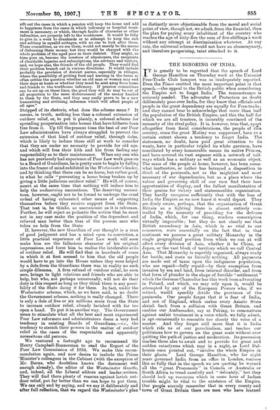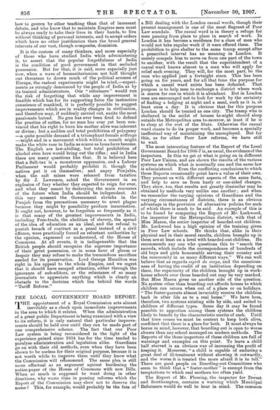THE IGNORING OF INDIA.
IT is greatly to be regretted that the speech of Lord George Hamilton on Thursday week at the Unionist Free-Trade Club banquet was so inadequately reported. Even the Times omitted the most important point in that speech,—the appeal to the British public when considering the Empire not to forget India. The remonstrance is seriously needed. The advocates of Protection no doubt deliberately pass over India, for they know that officials and people in the great dependency are equally for Free-trade ; and they cannot bear to acknowledge that more than half the population of the British Empire, and this the half for which we are all trustees, is incurably convinced of the necessity of the rival policy. It is, however, true that, apart altogether from fiscal considerations, the people of this country, since the great Mutiny was suppressed, have to a certain extent shown a tendency to forget India. The statesmen, no doubt, have paid great attention to its wants, have in particular tripled its white garrison, have conciliated by every honourable means its native Princes, and have covered its vast expanse with a network of rail- ways which has a military as well as an economic object. The mass of the people at home, however, has been some- what inattentive, or rather has betrayed a disposition to think of the peninsula, not as the mightiest and most necessary of our dependencies, but as a place where the valour and governing skill of our race find their best opportunities of display, and the fullest manifestation of their genius for victory and statesmanlike organisation. They hardly recognise sufficiently that with the loss of India the Empire as we now know it would depart. They are dimly aware, perhaps, that the organisation of Great Britain as a fighting State is almost entirely con- trolled by the necessity of providing for the defence of India, which, for one thing, renders conscription virtually impossible ; but they do not clearly see that British ascendency in Asia, which is so vital to our commerce, rests essentially on the fact that in that continent we possess a great military Monarchy in the single geographical position from which we can at will affect every division of Asia, whether it be China, or Japan, or the vast block of territory which we call Central Asia. That Monarchy is superbly organised, always ready for battle, and costs us literally nothing. All payments are made out of taxes upou the indigenous population, who are repaid—fully repaid—by their exemption from invasion by sea and land, from internal disorder, and from that form of plunder in the shape of forcible " settlement " which the German Chancellor has this week been advocating in Poland, and which, we may rely upon it, would be attempted by any of the European Powers who, if we retired, would speedily divide the provinces of the peninsula. Our people forget that it is fear of India, and not of England, which makes every Asiatic State shrink back from a collision with Great Britain, and enables our Ambassador, say at Peking, to remonstrate against unfair treatment in a voice which, we fully admit, is apt occasionally to resemble too closely the voice of a master. And they forget still more that it is India which rids us of our parochialism, and teaches our politicians how to govern on the great scale without ever quitting the path of justice and moderation. Its possession teaches them also to await and to provide for great and sudden cataclysms which may in a night, as Lord Dal- housie once pointed out, " involve the whole Empire in their gloom." Lord George Hamilton, who for eight years governed India from an office in London, realises this so fully that in the speech we are quoting he warned all the " great Proconsuls " in Canada or Australia or South Africa to tread carefully and " delicately," lest they should lock up resources which in some hour of Indian trouble might be vital to the existence of the Empire. Our people scarcely remember that in every county and town of Great Britain there are men who have learned how to govern by other teaching than that of incessant debate, and who know that to maintain Empires men must be always ready to take their lives in their hands, to live without thinking of personal interests, and to accept orders which have no other justification than the broad general interests of our vast, though composite, dominion.
It is the custom of many thinkers, and more especially of those who have studied India while administering it, to assert that the popular forgetfulness of India is the condition of good government in that secluded possession. But for that, it is said, more especially just now, when a wave of humanitarianism not half thought out threatens to drown much of the political acumen of Europe, the rashest experiments might be tried,—experi- ments as strongly denounced by the people of India as by its trained administrators. Our " reformers " would run the risk of forgetting that while any improvement is feasible which has for its supporting force the instinctive conscience of mankind, it is perfectly possible to suggest improvements which are in reality changes in civilisation, and therefore may, if suddenly carried out, excite the most - passionate hatred. No gun has ever been fired to defend the practice of suttee, for no man has ever yet been con- vinced that his right to burn his mother alive was inherent or divine ; but a sudden and total prohibition of polygamy —a quite possible demand of a triumphant female suffrage —might end in a movement which within a month might make the white race in India as scarce as lions have become. The English are law-abiding, but total prohibition of alcohol even here would bring out the rifles ; and in India there are many questions like that. It is believed here that a Salt-tax is a monstrous oppression, and a Labour Parliament would probably prohibit it, though the natives put it on themselves ; and angry Punjabis, when the salt mines were released from taxation by Sir J. Lawrence, asked the Government in an explosion of fury whether they expected to reign for ever, and what they meant by destroying the main resources of the future when India should be independent. At this very moment the Government shrinks in the Punjab from the precautions necessary to avert plague because they might by possibility produce insurrection. It ought not, however, to be forgotten so frequently as it is that many of the greatest improvements in India, including Free-trade, the abolition of slavery, the spread of the idea of education as an ideal, and the refusal to punish breach of contract as a penal instead of a civil offence, were practically forced on reluctant authorities by the opinion, expressed or understood, of the House of Commons. At all events, it is indispensable that the British people should recognise the supreme importance of their great possession, or in some hour of gloom or despair they may refuse to make the tremendous sacrifices needed for its preservation. Lord George Hamilton was right in his appeal to the whole Empire, and we regret that it should have escaped attention, either through the ignorance of sub-editors, or the reluctance of so many journalists to appreciate anything which is clearly an obstacle to the doctrine which lies behind the words " Tariff Reform."



















































 Previous page
Previous page